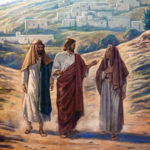Both the kingdom of God and the United States of America would be better off if evangelical Christians—particularly white folks—would stop sulking about their stripped-down social status and park their pining for purloined power.
 Marv KnoxIt’s past time for evangelicals—millions of Baptists included—to unshackle ourselves from cultural privilege and to live out the central message of our Savior. Jesus pointedly explained he came to earth to “preach good news to the poor, … to proclaim release to the captives and recovery of sight to the blind, to set free those who are oppressed, to proclaim the favorable year of the Lord” (Luke 4:18-19). Jesus stressed his followers serve him when they serve the hungry, thirsty, strangers, naked, sick and imprisoned (Matthew 25:34-46).
Marv KnoxIt’s past time for evangelicals—millions of Baptists included—to unshackle ourselves from cultural privilege and to live out the central message of our Savior. Jesus pointedly explained he came to earth to “preach good news to the poor, … to proclaim release to the captives and recovery of sight to the blind, to set free those who are oppressed, to proclaim the favorable year of the Lord” (Luke 4:18-19). Jesus stressed his followers serve him when they serve the hungry, thirsty, strangers, naked, sick and imprisoned (Matthew 25:34-46).
Ironically, evangelicals jump to the head of the line to criticize “culture,” primarily popular media and entertainment, a broad array of sexual issues, the federal government and education.
“Foreign” culture
Unfortunately, evangelicals often reflexively embrace a culture foreign to the gospel of Jesus. It’s a culture of prestige and privilege, available primarily to white middle- and upper-class Americans. A culture comfortable with commercial and political power. A culture that fails to consider the context of peoples’ backgrounds and sees their lives in black and white, mostly black.
Evangelical Christians bemoan how they’re losing their grip on their culture. The latest documentation comes from the nonpartisan Pew Research Center.
“A growing share of self-identified ‘evangelical or born-again’ Protestants (41 percent) say it has become more difficult to be an evangelical Christian in the United States,” Pew reported July 14. “Just 34 percent answered the question the same way in September.”
The comfort gap is 15 points between nonwhite evangelicals (31 percent) and white evangelicals (46 percent) who say being an evangelical Christian is becoming harder. Hmmm. White evangelicals have a harder time than their nonwhite sisters and brothers?
Demographer Robert P. Jones calls this The End of White Christian America, the title of his new book. In The Atlantic, Jones notes white Christians (Protestants and Catholics) now comprise only a minority of Americans—47 percent. And the proportion of white Protestants (mainline and evangelical) is much smaller—32 percent. Meanwhile, the religiously unaffiliated has grown to one in five Americans.
Sign up for our weekly edition and get all our headlines in your inbox on Thursdays
So, white evangelicals are losing their overall demographic status to nonwhite Americans, and their religious dominance is being eroded by the nonreligious, or so-called “nones.”
Panic in real time
No wonder white evangelicals are panicking. We’ve seen it graphically this year. One manifestation is the destabilizing, unpredictable presidential campaign. Another is the spate of proposed state laws that run the gamut from protecting “religious liberty” (often conservative Christians’ liberty, but nobody else’s) to determining who can go where to use the bathroom.
All of this is unsettling, to be sure. We live in volatile, calamitous times. On top of everything else, racial tension and fear heighten anxiety for practically everyone.
A couple of caveats:
Millions of evangelicals are engaged in expressions of concern for people Jesus called “the least.” But far too many disconnect the dots. They compassionately minister to specific needs but turn a blind eye to the systemic causes of those needs.
Most evangelicals don’t intend to be racist (or classist). They’re just accustomed to privilege and don’t want to give it up. This makes them suckers for demagogues who thrive on pitting “little people” against each other.
Evangelical idolatry
Long term, and on a deep level, white evangelical Christians’ sheer panic is devastatingly disconcerting. It reveals disturbing idolatry. Rather than dependence upon God, far too many white Christians in American have grown comfortable relying upon political and cultural control, racial dominance and economic security.
None of these, of course, has anything to do with the gospel. Whether we like it or not, a leveling of economic, social and political power is not a sign of the apocalypse.
Good news for the gospel
In fact, it could signal good news for the gospel. Christianity is most vibrant and growing fastest in parts of the world where followers of Jesus are poor and politically powerless. U.S. Christians who say they want to see a revival in America may find the key is more dependence upon God and less reliance upon economic and political power.
If we want to influence America, the place to start isn’t the White House or Congress or the corporate suite. If we want America to be great again, evangelical Christians can start by being known as the people who stand up for the poor, the prisoners, the blind, the oppressed, the hungry, the thirsty, the strangers, the naked, the sick and the prisoners.
In other words, we can be the church—the incarnated body of Jesus Christ.
Follow Marv on Twitter: @marvknoxbs














We seek to connect God’s story and God’s people around the world. To learn more about God’s story, click here.
Send comments and feedback to Eric Black, our editor. For comments to be published, please specify “letter to the editor.” Maximum length for publication is 300 words.